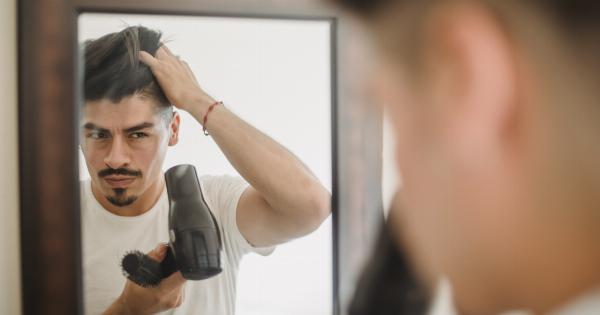Having healthy, strong, and lustrous hair is a goal for many people. However, factors like poor nutrition, stress, hormonal imbalances, and genetics can contribute to hair loss.
While there are various treatments available, addressing the underlying causes of hair loss is essential for long-term results. One of the most effective ways to do this is by incorporating proper nutrition into your daily routine. In this article, we will explore the top nutrition tips to reduce hair loss and promote healthy hair growth.
The Role of Nutrition in Hair Health
Just like any other part of your body, your hair needs proper nutrition to thrive. Hair is mainly composed of a protein called keratin, which makes up the structural component of each strand.
Therefore, a diet rich in protein is crucial for healthy hair growth and to minimize hair loss.
Additionally, several key vitamins and minerals play essential roles in maintaining hair health. For instance, vitamin A helps in the production of sebum, an oily substance that moisturizes the scalp and keeps hair conditioned.
B vitamins, especially biotin, are important for overall hair strength and growth. Vitamins C and E are powerful antioxidants that protect hair follicles from damage caused by free radicals. Iron, zinc, and omega-3 fatty acids also contribute to healthy hair growth.
Include These Essential Nutrients in Your Diet
1. Lean Protein
Ensuring an adequate intake of protein is crucial for strong and healthy hair. Include lean sources of protein such as chicken, turkey, fish, eggs, and low-fat dairy products into your diet.
Plant-based protein sources like beans, lentils, nuts, and seeds are also excellent options for vegetarians and vegans.
2. Iron-Rich Foods
Iron deficiency is a common cause of hair loss. Include iron-rich foods like lean red meat, poultry, fish, spinach, kale, broccoli, and beans in your diet to boost iron levels.
Combining these foods with vitamin C-rich sources like oranges, bell peppers, and strawberries can enhance iron absorption.
3. Omega-3 Fatty Acids
Omega-3 fatty acids play a crucial role in promoting healthy hair growth. Include fatty fish like salmon and mackerel, as well as walnuts, chia seeds, and flaxseeds in your diet to increase your omega-3 intake.
4. Vitamin A-Rich Foods
Vitamin A helps in the production of sebum, the oily substance that nourishes and moisturizes the scalp. Include foods like carrots, sweet potatoes, pumpkins, kale, and spinach in your diet to boost your vitamin A intake.
5. Biotin-Rich Foods
Biotin is a B vitamin that is essential for hair growth and strength. Include biotin-rich foods like eggs, almonds, walnuts, whole grains, avocados, and mushrooms in your diet to support healthy hair.
6. Vitamin C-Rich Foods
Vitamin C is a powerful antioxidant that protects the hair follicles from damage caused by free radicals. Include citrus fruits, strawberries, kiwi, bell peppers, and dark leafy greens in your diet to boost your vitamin C intake.
7. Vitamin E-Rich Foods
Vitamin E also acts as a potent antioxidant and helps in improving hair health. Include foods like almonds, sunflower seeds, spinach, Swiss chard, and avocados in your diet to enhance your vitamin E levels.
8. Zinc-Rich Foods
Zinc plays a crucial role in hair tissue growth and repair. Include oysters, beef, lamb, pumpkin seeds, lentils, and chickpeas in your diet to increase your zinc intake.
9. Silica-Rich Foods
Silica is a mineral that helps in maintaining collagen production, which is essential for healthy hair growth. Include foods like cucumbers, bell peppers, oats, millet, and rice in your diet to boost your silica intake.
10. Drink Plenty of Water
Hydration is essential for overall hair and scalp health. Ensure you drink an adequate amount of water each day to keep your hair well-hydrated.
Avoid These Nutritional Culprits
In addition to incorporating nutrient-rich foods into your diet, it’s important to avoid certain culprits that can contribute to hair loss. These include:.
1. Excessive Alcohol Consumption
Excessive alcohol intake can lead to poor nutrient absorption and nutrient deficiencies, which can impact hair health. Limit your alcohol consumption to promote healthy hair growth.
2. Processed and Sugary Foods
Foods high in sugar and processed ingredients can contribute to inflammation and oxidative stress, leading to weak and damaged hair. Opt for whole, unprocessed foods as much as possible.
3. High-Sodium Foods
Consuming excessive sodium can lead to water retention and dehydration, affecting hair health. Reduce your intake of high-sodium processed foods like chips, canned soups, and fast food.
4. Trans Fats
Trans fats found in fried and processed foods can lead to inflammation and oxidative stress, which can negatively impact hair health. Replace these unhealthy fats with sources of healthy fats like avocados, nuts, and seeds.
Supplement Your Diet If Needed
While a balanced diet is usually sufficient to provide all the necessary nutrients for healthy hair, some individuals may require dietary supplements.
If you suspect a deficiency or have specific dietary restrictions, consult a healthcare professional to determine if supplementation is necessary.
Common supplements that promote hair health include:.
1. Biotin Supplements
Biotin supplements are widely used to support hair growth and strength. Consult a healthcare professional for the appropriate dosage and duration.
2. Iron Supplements
Iron supplements may be recommended for individuals with iron deficiency anemia or insufficient iron levels. However, it’s important to consult a healthcare professional before taking any iron supplements, as excess iron can be harmful.
3. Omega-3 Fatty Acid Supplements
If you struggle to consume enough omega-3 fatty acids through your diet, supplements can be a convenient alternative. Consult a healthcare professional for advice on dosage and quality.
Incorporating Nutritional Changes Into Your Routine
Along with improving your diet, certain lifestyle changes can also promote healthy hair growth and reduce hair loss:.
1. Manage Stress
Chronic stress can contribute to hair loss. Employ stress-management techniques such as exercise, meditation, deep breathing exercises, and getting enough sleep to promote healthy hair growth.
2. Avoid Harsh Hair Treatments
Excessive heat styling, chemical treatments, and tight hairstyles can damage hair follicles and contribute to hair loss. Opt for gentle styling methods and avoid excessive use of heat tools.
3. Be Gentle While Brushing
Being rough while brushing or towel-drying your hair can lead to breakage and hair loss. Use a wide-toothed comb or a brush with soft bristles to prevent unnecessary hair damage.
4. Protect Your Hair from the Sun
Excessive sun exposure can damage hair proteins and make your hair more prone to breakage. Wear a hat or use hair products with SPF when spending time under the sun.
Conclusion
Proper nutrition plays a vital role in reducing hair loss and promoting healthy hair growth.
By incorporating nutrient-rich foods into your diet and avoiding nutritional culprits, you can significantly improve the overall health and strength of your hair. Additionally, lifestyle modifications like managing stress, being gentle with your hair, and protecting it from the sun will also contribute to optimal hair health. Remember, consistency is key, and it may take some time to see visible improvements.
Consult a healthcare professional for personalized advice and guidance on addressing hair loss concerns.
























